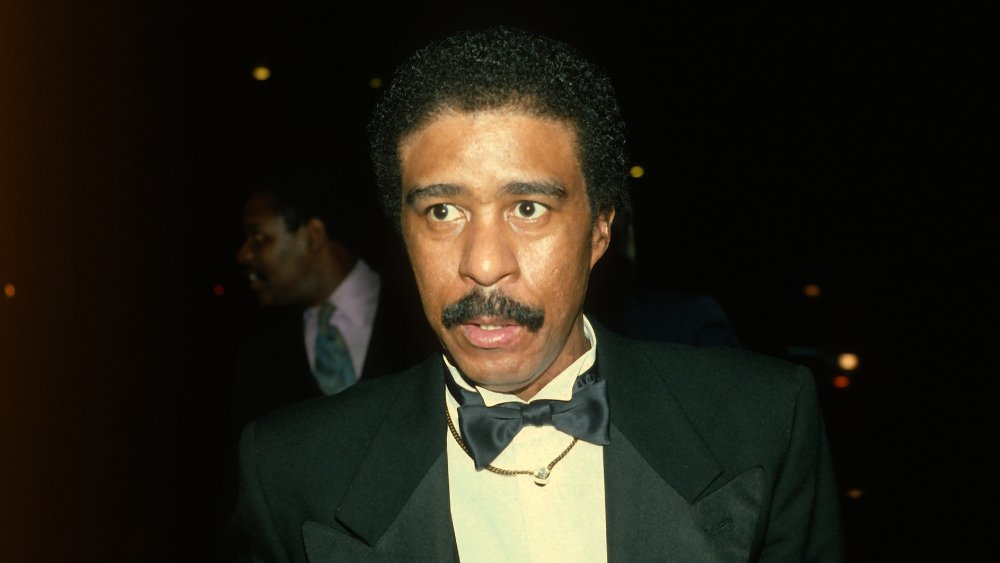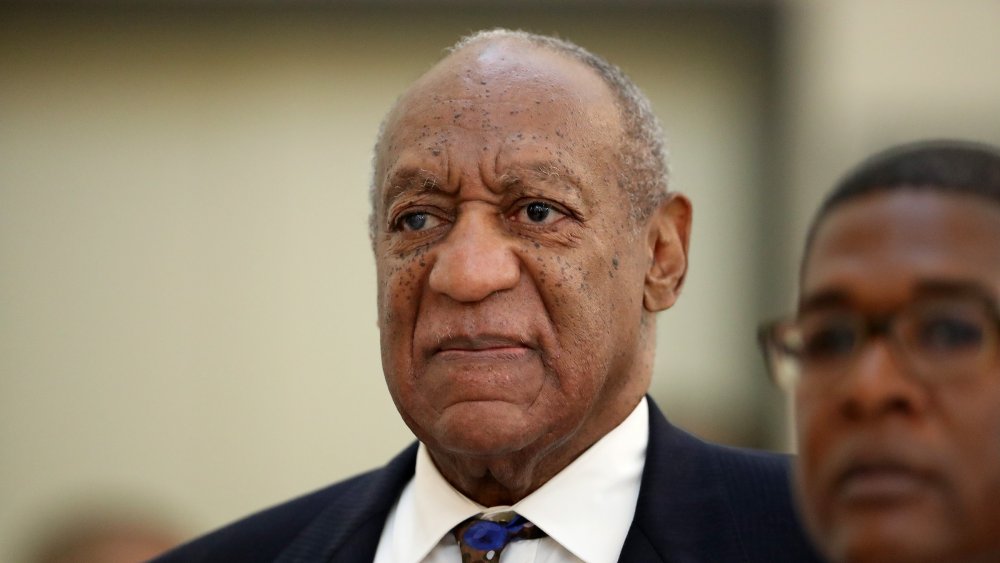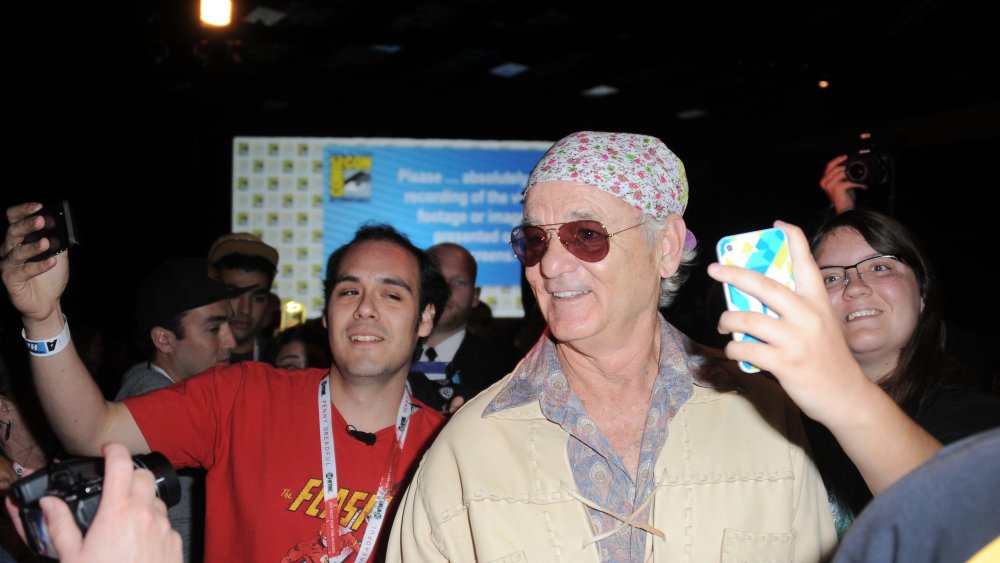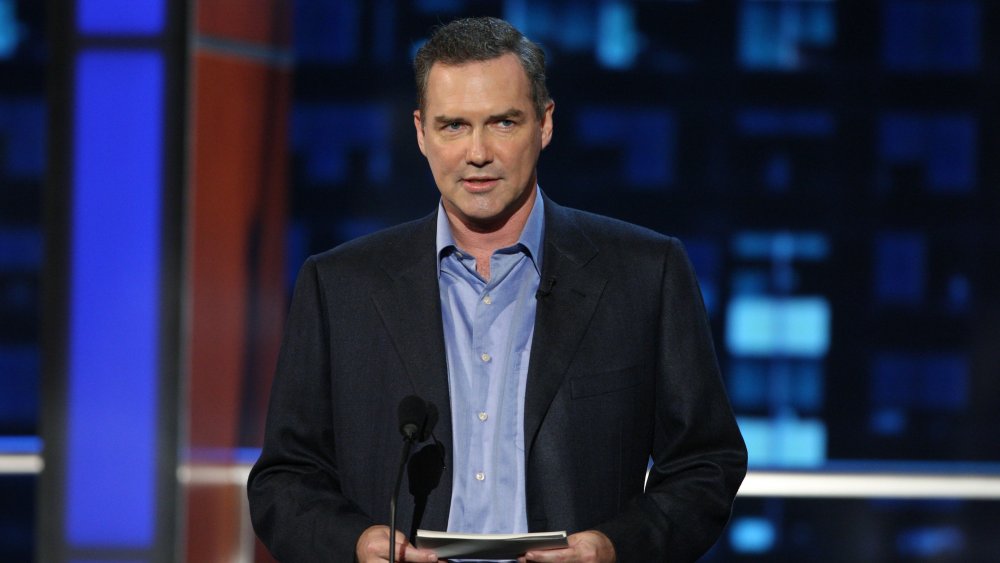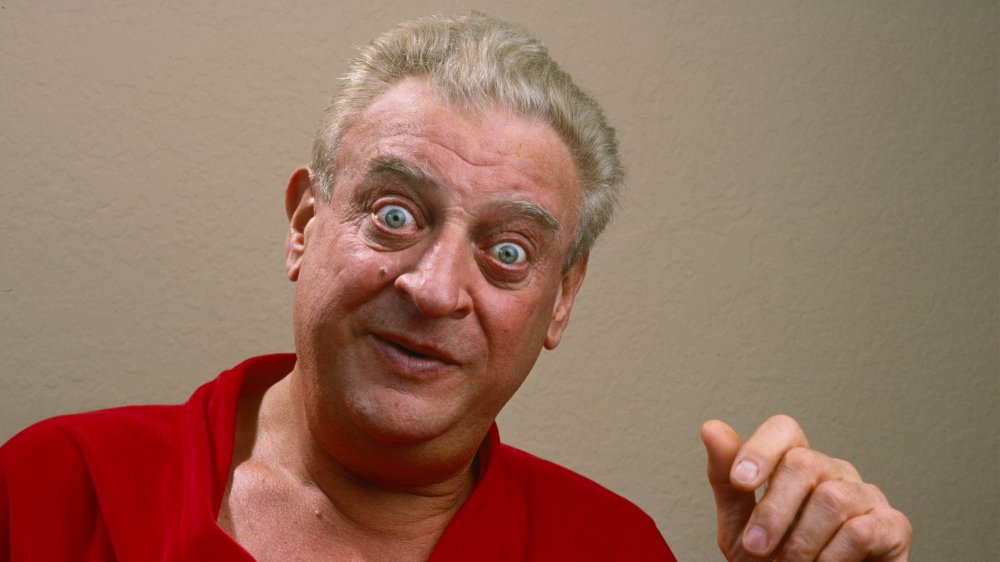Comedian Rumors That Turned Out To Be True
In recent decades, comedy has become as big as rock 'n' roll. It's huge, with big-name comedians filling out stadiums and bagging themselves lucrative specials on streaming platforms worth millions of dollars. And with that kind of global stardom comes the same baggage and behavior that has made the lives of rock stars and Hollywood actors something that fans obsess over: the scandals, breakups, feuds, and legal battles.
For the tabloids, this has meant a new cast of characters to spin tales about, speculate over, and investigate the lifestyles of, knowing that there's a receptive audience for nuggets of information about the performers who seem to offer so much of themselves onstage but who also readily admit that the divide between what is real and what is part of their comedic personas may be difficult to distinguish. Stand-up comedy, especially, invites us to believe that we know the performer personally, which makes insights into their privates lives — and the potential confirmation that we were right in our assumptions about them — even more irresistible.
But whether comedians really do turn out to be who they say they are onstage, the stories that arise about their offstage antics are always of interest, whether you're a fan of their particular brand of comedy or not. Here's a roundup of a few of the most revealing, shocking, and entertaining rumors about comedians that were revealed to be true.
Richard Pryor had an affair with Marlon Brando
Richard Pryor's personal life gained much attention during his heyday as addiction and mental health problems combined with a roller-coaster love life. What has endeared Pryor to millions since he first became arguably the world's biggest alternative comedian back in the 1970s, however, is the fact that the stories about him that wound up in the press would be dealt with and talked about more honestly, candidly, and truthfully in his stage shows: from his addiction to cocaine, to his arrest for firing bullets into his own parked car, to his horrifying self-immolation.
Pryor is no longer with us, unfortunately, so we can't get his take on the reason for him hitting the news in 2018: an apparent affair with the legendary actor Marlon Brando. The story came out of nowhere during a freewheeling interview music producer Quincy Jones, a friend of both men, gave to Vulture. Initially, most commentators reacted with disbelief — Jones' whole interview was full of outlandish claims. But then Pryor's widow, Jennifer Lee, publicly confirmed the liaison. This would all be idle gossip if it weren't for the fact that, as Lee points out, Pryor himself was open with his friends about his bisexuality, a part of him that he also attempted to share onstage, according to The Advocate, at a gay rights benefit show in 1977. It is worth mentioning, however, that some of Pryor's children deny Lee's claims.
Bill Cosby put his crimes into an early set
The downfall of Bill Cosby and the string of atrocious crimes that he kept covered up for years are such big news stories that it's almost impossible not to have heard about it already. But one part of the story is worth sharing: that, shockingly, Cosby had been openly discussing the drugging and assaulting of women for decades. The subject appears in a bit from a 1969 live album — unfortunately titled It's True! It's True! – that was unearthed by The Village Voice in 2014, material which has also appeared in recently recovered interview footage from 1991.
It is said that the past is another country, that they do things differently there. And maybe it has something to do with the fact that "America's Dad" had such a wholesome image at the height of his fame that if he were to discuss such issues, it was automatically assumed that he was talking about it ironically, or that what he was saying didn't seem creepy somehow. But it really does bend the brain of anyone listening to it today that Cosby could get laughs from joking about the use of what he called at the time "Spanish Fly" — quaaludes, as the drug turned out to be — that he insinuates makes it easier to sleep with women after dropping a pinhead-sized dose in their drink.
Monty Python reunited to pay off a lawsuit
In 2013, producer Mark Forstater — who worked on Monty Python and the Holy Grail – finally won a seven-year case against the Monty Python comedy troupe worth £800,000, according to The Guardian. He had argued that he hadn't been adequately paid for the Eric Idle-penned musical Spamalot, a huge stage hit which is based on the movie and which references much of the material that Forstater had worked on.
The timing, then, of the Monty Python reunion the following year seemed quite fitting for a group of performers who very publicly owed their former collaborator a wad of money — not that the troupe has ever been shy about letting the public know what motivates them. Previously, John Cleese had referenced his personal legal troubles when he performed under the title The Alimony Tour, while their 1980 LP Monty Python's Contractual Obligation Album directly references the legal requirements that led to the album's release. It was then unsurprising that members of the group were open about the reasoning behind their reunion show during interviews.
Originally planned as a one-night-only gig at London's O2 Arena, the show sold out in 43 seconds. The demand was such that the run was extended to ten nights, with the final night broadcast live to cinemas around the world.
David Letterman censored Bill Hicks
Toward the end of his short life, Bill Hicks was looking to make greater inroads with American audiences. In the early days, the stand-up found that his cynical routines went down much better in the UK and toured the country extensively. But in 1993, Hicks found himself invited for his 12th and, as it would turn out, final appearance on Late Night with David Letterman. His set, as ever, was tight and outrageously funny, and his material toyed with subjects on the borderline of addressability. Most notably, he discussed abortion and joked about the kinds of people who make up the "pro-life" movement.
The set was well-received by the audience and, indeed, by Letterman himself in the short interview that followed. However, the set was pulled with little explanation, which Hicks discussed in a New Yorker profile weeks later, telling journalist John Lahr that the resulting fallout had given him "more attention than [his] other eleven Letterman appearances times one hundred." The tragedy of the amazing coverage that the incident would attract was that Hicks had, by the time of his interview, already been diagnosed with terminal pancreatic cancer and would die just four months later at the age of 32.
Letterman finally apologized and admitted culpability only in 2009, on a show in which he finally aired the "lost" set, while Hicks' mother was on the show as a guest.
John Oliver wasn't popular in the UK
Last Week Tonight is now a huge phenomenon, and its deep-dive investigative style of discussing contemporary issues — with plenty of jokes thrown into the mix — is the perfect antidote to the mad times we're all living through. As Vox has noted, Last Week Tonight is not "just" a comedy show.
But John Oliver is definitely a comedian, having cut his teeth on the British comedy stand-up circuit before moving to the US in 2006 and meeting his future wife, Kate, a U.S. Army veteran. (He became a US citizen in 2019.) He made several appearances on UK panel shows and wasn't an entirely unfamiliar face to most when the global success of Last Week Tonight meant that he was once again in front of British audiences. But it is certainly true that Oliver was far from a huge success in his homeland, something which he has joked about on his show often. A UK station apparently turned Oliver down from a Daily Show-style role because they didn't like his accent, according to Chortle, while BBC America now admits that Oliver's Last Week Tonight success is a case of Britain allowing a talent to "slip through its fingers."
A thousand legendary encounters with Bill Murray
Bill Murray has been a star of Saturday Night Live, huge blockbusters like Groundhog Day and Ghostbusters, and a slew of critically acclaimed arthouse films like Lost in Translation and The Life Aquatic with Steve Zissou. In recent years, however, fans and news outlets have been increasingly drawn to reports of his outlandish behavior when he's off-camera.
From numerous photobombs to crashing parties, no one interacts with his fans quite like Bill Murray. Our favorite story is perhaps the time he was randomly invited to a house party by some Norwegian students who were living in the small Scottish town of St. Andrews in 2006. Murray accepted, to the students' astonishment, only to spend a good deal of the night in the kitchen doing the dishes, as photo evidence later proved.
The story was the talk of the town before being picked up by national and international news.
It's all coming out about "mean" Ellen DeGeneres
2020 has seen talk show queen Ellen DeGeneres almost dethroned, with revelations about working conditions on her show tarnishing her image and reputation for super-niceness. But the backlash against DeGeneres didn't appear out of nowhere. In fact, the revelations just serve to add fire to rumors which have been circulating for years in comedy circles about DeGeneres' legendary "meanness."
Back in 2018, Nicki Swift compiled a range of accusations that had emerged in recent years concerning DeGeneres and her show, including the claim that staff were treated like "peasants," that she played favorites to set staff against one another, that she hissed at writers, and that she turned her back on her writing team during the 2007 writers' strike.
In recent months, comedians such as Joe Rogan, who has been in the comedy industry nearly as long as DeGeneres herself, have made a point of stating that the chasm that exists between her onstage persona and her real-life personality has been an open secret among comedians and celebrities for years. Perhaps it is only in 2020, in a year where so much is being challenged, that the star is finally being called out — or that people are actually starting to listen.
Why Norm Macdonald was really fired from SNL
The cult of Norm Macdonald has only grown in recent years, due to the great success of his YouTube podcast Norm Macdonald Live, a much talked-about set on Letterman's final episode of Late Night, and an excellent recent Netflix special, Hitler's Dog: Gossip & Trickery. But it is perhaps Macdonald's role at the helm of the "Weekend Update" segment of Saturday Night Live in the mid-'90s for which he is still most celebrated, with many recent inhabitants of the role pointing to his example as what they were attempting to emulate.
But the fact is that Macdonald — as well as his Weekend Update co-writer Jim Downey — were both fired from the show in 1998 after three and a half years of writing and performing the segment. Discussing his firing during an interview with Letterman the week the story broke, Macdonald made light of the issue, claiming that he'd been fired because the president of NBC's West Coast division, Don Ohlmeyer, had decided he wasn't funny.
However, rumors began to circulate that it was Macdonald's near-weekly joking at the expense of O.J. Simpson that got him fired. Ohlmeyer was one of Simpson's oldest friends and most vocal defenders and took exception to Simpson being used as a punchline, according to The Daily Beast. That Macdonald returned as guest host of SNL less than two months later is a testament to the fact that his funniness was never really in doubt.
Rodney Dangerfield's schtick wasn't a total act
Legendary stand-up comedian, actor, and chat show guest Rodney Dangerfield was famous for his downtrodden demeanor and self-deprecating material, with the immortal catchphrases "I don't get no respect!" and "It's not easy being me!" being signatures of his act and style. But the self-effacing tone of Dangefield's performances was indicative of something very real: the specter of depression, which was to haunt him throughout his life even as he made his way into the upper echelons of the American comedy A-league.
Dangerfield was only diagnosed with clinical depression by the time he had already reached what most of us would consider retirement age, according to Spokesman, but the effects of it were felt throughout his life. As Dangerfield's wife at the time of his death, Joan, points out, the comedian was born into an unloving household, which not only shaped his act but also affected his mental health.
The intertwining of Dangerfield's act and his real-life self-image is perhaps reflected in the unusual title given to his obituary in The New York Times in 2004: "Rodney Dangerfield, Comic Seeking Respect, Dies at 82."
Ricky Gervais started out as a (failed) musician
The Office (UK) was hilarious from its opening scene and heralded the arrival of a new comic talent in the shape of Ricky Gervais, who, until that point, had only existed on the periphery of our collective comedy consciousness. But it was the fourth episode of the first season — "Training" — which catapulted Gervais, in the guise of cringeworthy middle manager David Brent, to the status of a comic icon. After repeatedly disrupting a team training day by constantly undermining the authority of the external facilitator, Brent ends the episode with tales of his time "in a band" and treats his nonplussed (or, in Gareth's case, sycophantic) team members to a series of self-penned songs on his acoustic guitar.
As mortifying as Gervais and his writing partner Stephen Merchant intended the songs to be, there was no denying that Gervais had some musical talent underpinning his performance. It should come as no surprise, then, that media outlets such as Time have unearthed early pictures of Gervais — impossibly slim and impressively made up — as part of the unknown new wave pop group Seona Dancing.
Gervais is famously a huge David Bowie fan, and in the songs available online, the influence is undeniable. In what must have been a surreal moment for Gervais, Bowie later performed a derisive song about the comic on his US breakthrough show Extras.
The South Park team really were on acid at the Oscars
Though the cult show would eventually win several Primetime Emmy Awards for Outstanding Animated Program, the news back in 2000 that South Park had been nominated for an Oscar was a big surprise, not least to the creators of the show themselves.
Their nomination was for Best Original Song for "Blame Canada," from the soundtrack of their summer 1999 hit movie South Park: Bigger, Longer & Uncut. As a joke, Trey Parker and Matt Stone decided to attend the awards in dresses, which drew plenty of attention to them on the red carpet, with Parker also wearing a long Jennifer Aniston-style wig.
Though wild behavior isn't exactly unexpected from the team behind South Park, it may have gone unnoticed that the demeanor of the pair was even more unusual than their outfits, with Parker especially looking wired and spaced out. It was later revealed in the 2011 documentary 6 Days To Air that the pair had actually dropped acid on the way to the event, and the drug had really started to kick in just before they were due to get out of their limo. So no, those uncontrollable smiles weren't just because they were so happy to be there.

